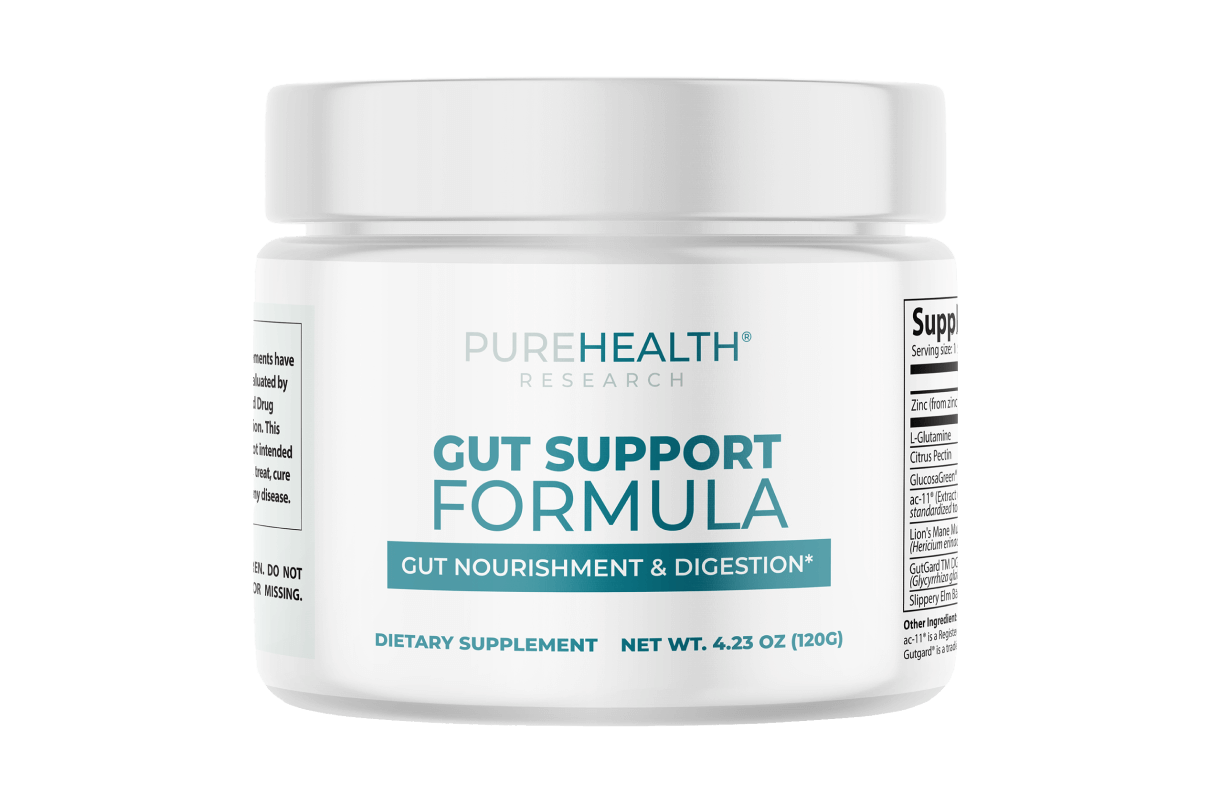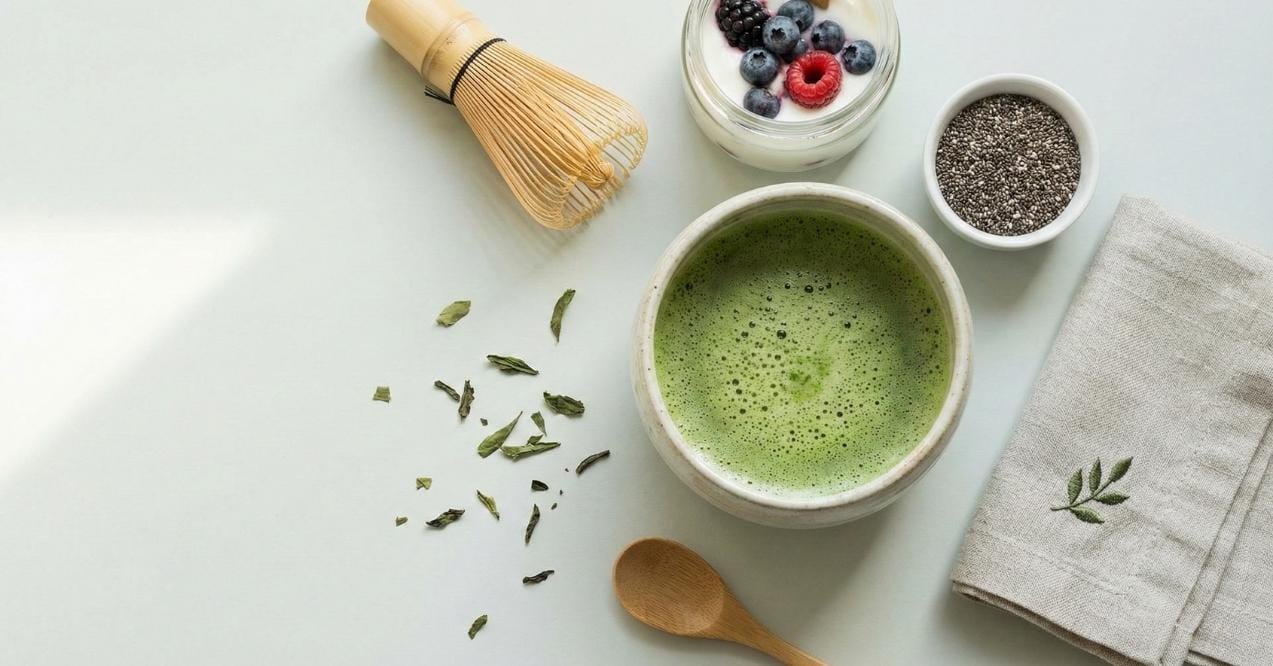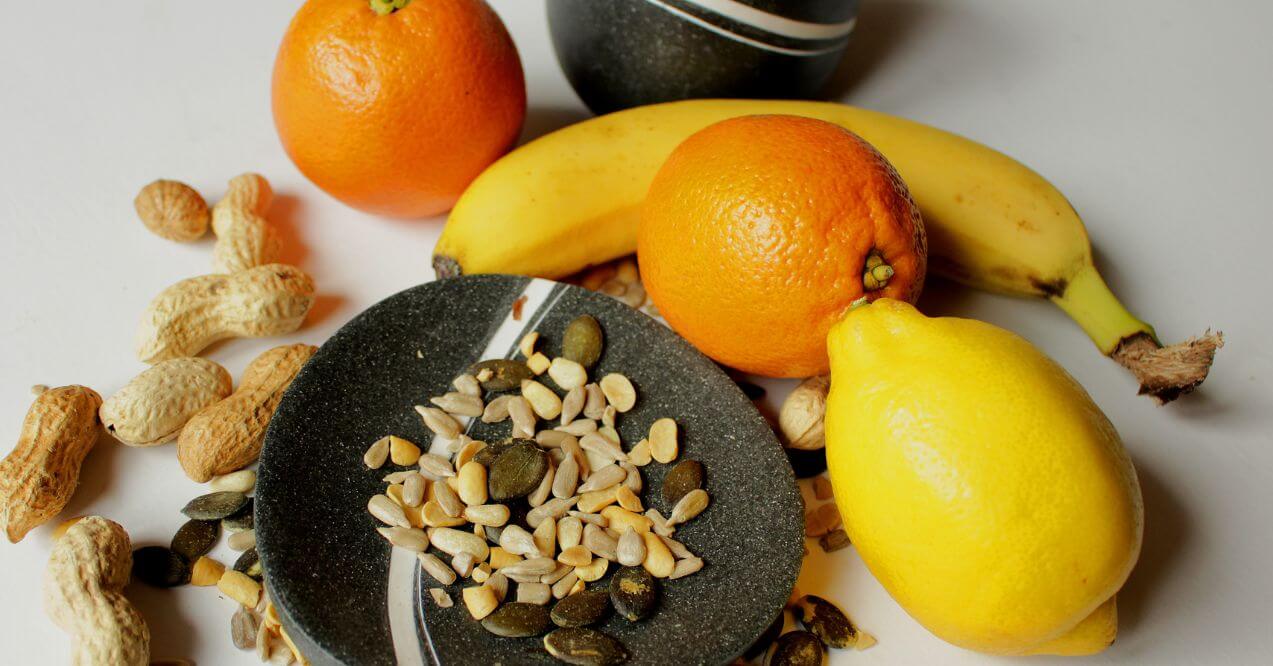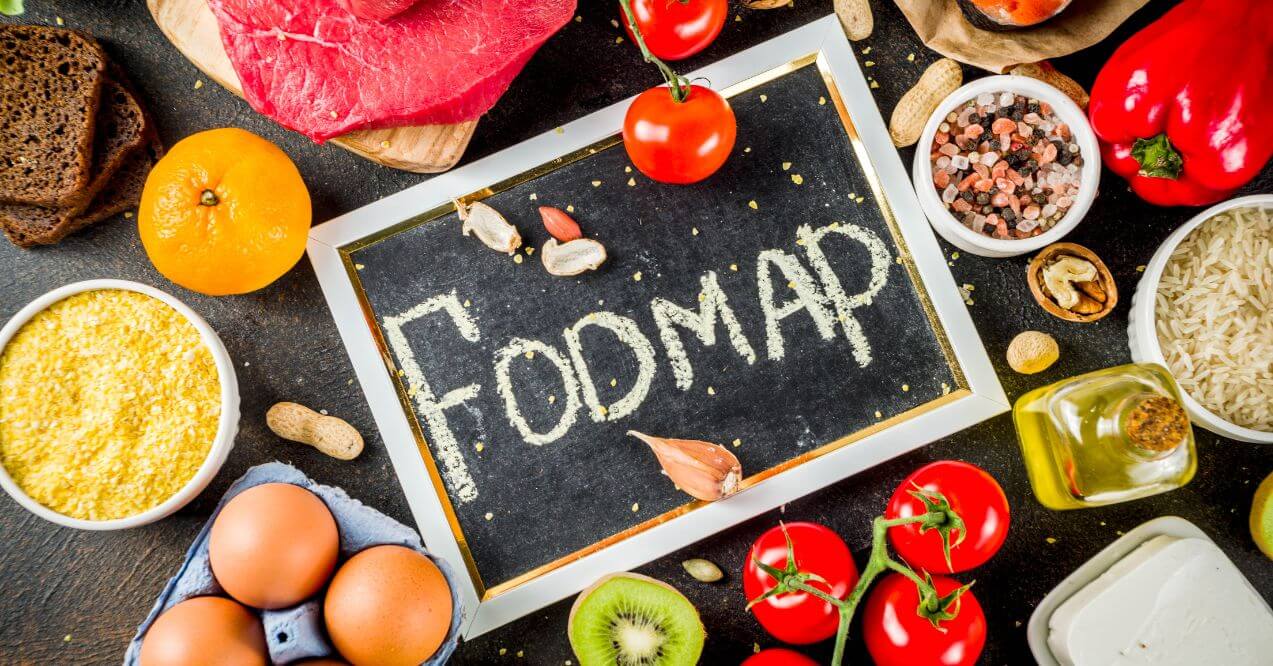Fructan Intolerance Causes, Symptoms, Solutions + Food List
Struggling with fructan intolerance? Discover symptoms, solutions, and how to manage it with dietary tips and lifestyle strategies.


Fructan intolerance is a common digestive challenge that affects a significant portion of the U.S. population, with studies suggesting it impacts nearly 30% of adults to some degree. Fructans are a type of carbohydrate found in various grains, vegetables, and fruits. These compounds can be difficult for some people to break down, leading to discomfort and digestive challenges.
In this blog, we’ll explore what fructan intolerance is, its symptoms, and how it compares to other sensitivities. You’ll also find a helpful food list, tips for managing fructan intolerance, and strategies to support your quality of life.
What is Fructan Intolerance?
Wondering what is fructan intolerance? It happens when the body has trouble digesting fructans, a type of carbohydrate found in foods like wheat, onions, garlic, and some fruits. Humans don’t have the enzymes needed to break down fructans. Instead, these carbohydrates are fermented by gut bacteria, which can cause digestive discomfort for some people.
Fructan intolerance is often linked to fructan malabsorption, where the small intestine doesn’t absorb fructans effectively. Many people with digestive sensitivities, such as IBS (irritable bowel challenges), also experience issues with fructans. This connection highlights how common fructan intolerance is in those with sensitive digestion..
Fructan Intolerance Symptoms

Fructan intolerance symptoms can vary from person to person but often involve digestive discomfort. These symptoms occur because the body struggles to process fructans, leading to fermentation in the gut. Common signs include:
- Bloating or a feeling of fullness after eating
- Excessive gas or flatulence
- Abdominal pain or cramping
- Changes in bowel habits, including loose stools or constipation
Less common symptoms may also appear, such as:
- Fatigue or low energy levels
- Headaches or mild discomfort in the head
- Difficulty focusing or brain fog
- Skin changes or irritations
While these symptoms are typically mild, they can significantly impact daily life if left unaddressed. If you notice persistent discomfort, digestive challenges, or other unexplained symptoms after eating foods high in fructans, it’s important to seek medical advice. A healthcare professional can help you understand your symptoms and create a plan to support your digestive health.
Fructan Intolerance vs. Fructan Allergy

Fructan intolerance and fructan allergy are often confused, but they are very different. Fructan intolerance happens when the body can’t digest fructans properly. This leads to symptoms like bloating, gas, and changes in bowel habits. These issues are caused by the gut fermenting fructans, not by an immune reaction.
A fructan allergy, however, involves the immune system. Allergic reactions may include skin irritation, hives, swelling, or difficulty breathing. These symptoms are rare and much more serious. Most food allergies are caused by proteins, not carbohydrates like fructans, making fructan allergies very uncommon.
If you experience allergic reactions after eating foods high in fructans, it’s important to seek medical advice. Testing can help you figure out if you’re dealing with an intolerance or a true allergy. This ensures you can manage your symptoms safely and effectively.
Fructan Intolerance vs. Gluten Sensitivity (NCGS)
Fructan intolerance and non-celiac gluten sensitivity (NCGS) are often confused because they can cause similar digestive symptoms like bloating, abdominal discomfort, and changes in bowel habits. However, the causes are different. Fructan intolerance stems from difficulty digesting fructans, while NCGS involves a sensitivity to gluten, a protein found in wheat, barley, and rye.
Interestingly, some people who think they are sensitive to gluten may actually react to fructans in gluten-containing foods. Identifying the true cause requires careful dietary observation or testing to ensure the right foods are avoided for better digestive health.
List of Foods High in Fructans
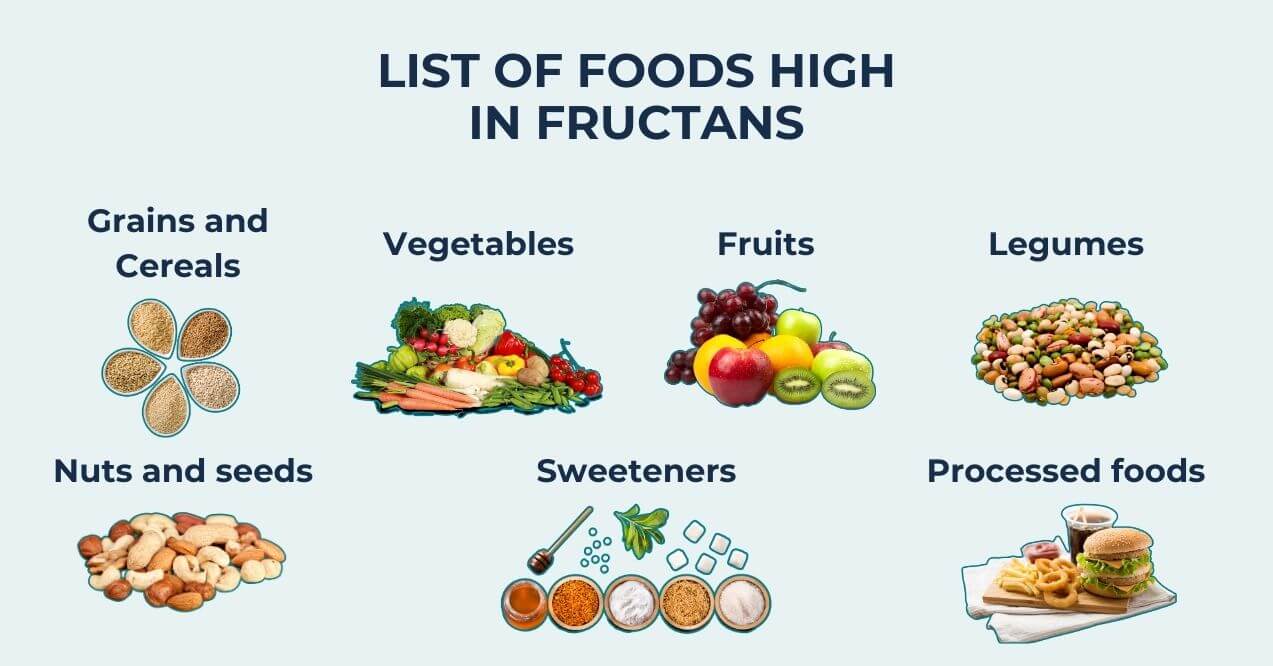
Understanding which foods are high in fructans can help you manage fructan intolerance more effectively. Fructans are found in a variety of foods, especially in certain grains, vegetables, fruits, nuts, and sweeteners. Below is a list of common foods that are rich in fructans:
Grains and Cereals
- Wheat products (bread, pasta, cereals)
- Rye
- Barley
Vegetables
- Onions (including shallots and spring onions)
- Garlic
- Leeks
- Asparagus
- Artichokes
- Broccoli
- Brussels sprouts
Fruits
- Bananas (especially when ripe)
- Watermelon
- Grapefruit
- Nectarines
- Persimmons
Legumes
- Chickpeas
- Lentils
- Kidney beans
- Black beans
Nuts and Seeds
- Cashews
- Pistachios
Sweeteners
- Agave nectar
- Honey
- High-fructose corn syrup
- Chicory root extract (inulin)
Processed Foods
- Foods containing inulin or fructo-oligosaccharides (check labels)
- Certain protein bars and shakes
By being aware of these high-fructan foods, you can make informed choices about your diet. It may be helpful to keep a food diary to track how different foods affect your digestion. Consulting with a healthcare professional or a nutritionist can provide additional guidance tailored to your needs.
How to Diagnose Fructan Intolerance?
Determining if you have fructan intolerance starts with observing how your body reacts to certain foods. One common method is an elimination diet, like the low-FODMAP diet. This involves removing high-fructan foods from your meals for a period. Then, you gradually reintroduce them one at a time to see which foods cause discomfort.
Another option is the hydrogen breath test. This non-invasive test measures hydrogen in your breath after you consume a fructan-rich drink. High levels of hydrogen can indicate that fructans aren’t being absorbed properly and are fermenting in your gut.
It’s helpful to consult a health professional, such as a registered dietitian, for guidance. They can offer personalized advice to help you adjust your diet and support your digestive health.
Tips on How to Manage Fructan Intolerance
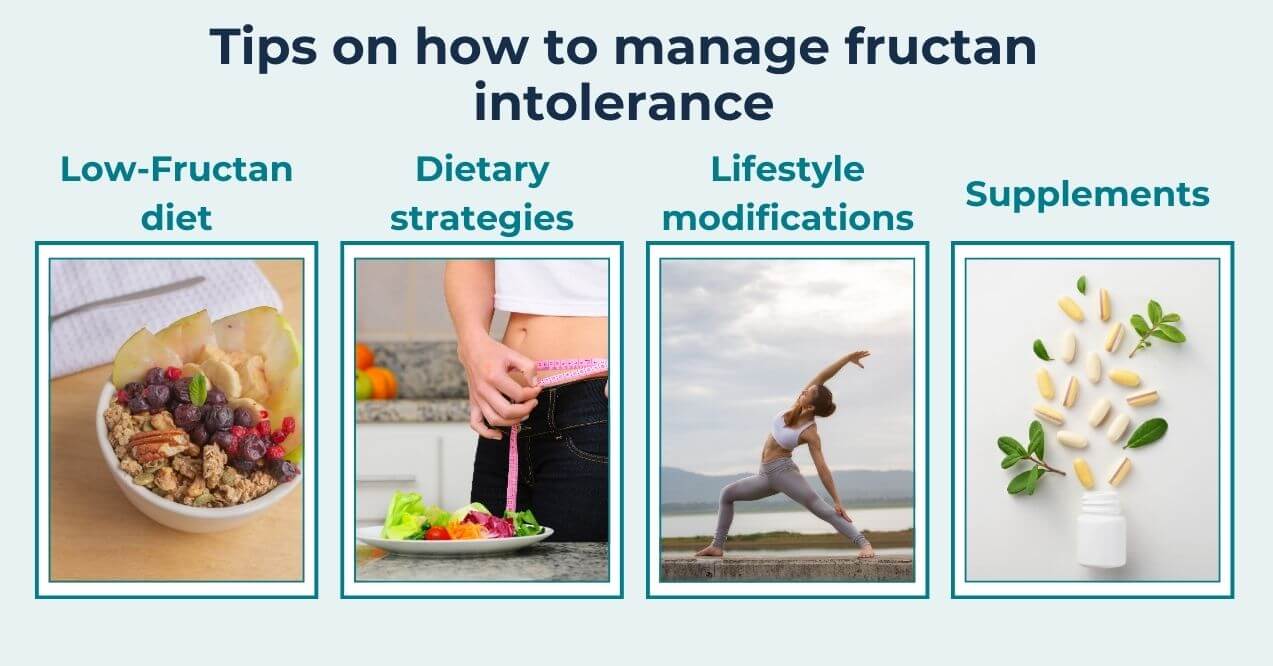
Managing fructan intolerance requires a well-rounded approach that addresses diet, lifestyle, and overall well-being. With careful planning and small adjustments, you can maintain digestive comfort and improve your quality of life.
1. The Low-Fructan Diet
Following a low-fructan diet is one of the most effective ways to manage fructan intolerance. Start by identifying fructan foods that trigger your symptoms. Foods to avoid include wheat-based products, onions, garlic, and certain fruits like bananas (ripe) and watermelon. Instead, focus on low-fructan options such as rice, quinoa, spinach, carrots, and citrus fruits. Keeping a food diary can help you track which foods work best for you.
2. Dietary Strategies
Small changes in how you prepare and consume food can make a big difference. Cooking methods like boiling or steaming can reduce the fructan content in some vegetables. Be mindful of portion sizes, as even low-fructan foods can cause symptoms if eaten in large amounts. Reading food labels is crucial, as processed foods often contain hidden fructans like inulin or chicory root extract.
3. Lifestyle Modifications
Your lifestyle plays an important role in managing fructan intolerance. Focus on stress management through activities like meditation or gentle yoga, as stress can worsen digestive discomfort. Supporting gut health with a balanced diet and adequate hydration is also key. Additionally, aim for consistent sleep and regular exercise to maintain overall well-being, which may indirectly reduce symptoms.
4. Supplements for Fructan Intolerance
Certain supplements can help manage fructan intolerance. Digestive enzymes may help break down fructans, while probiotics and prebiotics support gut health by encouraging a balanced microbiome. These supplements are one of the best supplements for gut health and digestion and can complement dietary and lifestyle changes to promote better digestive comfort.
If you’re looking for effective support for gut health, Gut Support Formula contains 14 premium-quality natural ingredients, including L-Glutamine, Licorice Root, and Citrus Pectin. Endorsed by Dr. Holly Lucille ND, RN, this formula is specifically designed to support digestion, maintain gut health, and promote a balanced microbiome. Its carefully chosen ingredients work together to promote digestive comfort and optimize overall digestive function. Adding Gut Support to your daily routine may help you feel healthier and more comfortable.
Life Quality With Fructan Intolerance
Living with fructan intolerance can impact your quality of life if left unmanaged, potentially leading to nutrient deficiencies and persistent discomfort. However, with the right strategies, you can maintain a fulfilling lifestyle.
When eating out, research restaurants with low-fructan options or ask about ingredient substitutions. Clear communication with staff and preparing in advance can make socializing easier. Building a support system is also essential. Join online communities to connect with others facing similar challenges and seek guidance from a registered dietitian for personalized advice. These steps can help you navigate fructan intolerance and improve your overall well-being.
Final Thoughts on Fructan Intolerance
Managing fructan intolerance is possible with the right knowledge and strategies. By understanding the condition, recognizing symptoms, and identifying trigger foods, you can take control of your diet and improve digestive comfort. A low-fructan diet, mindful eating habits, lifestyle changes, and targeted supplements like Gut Support Formula can help maintain your overall well-being.
Remember to seek professional guidance when needed and build a support system to stay on track. With careful planning, you can navigate fructan intolerance while maintaining a balanced, fulfilling lifestyle. Use these tips to make informed choices and support your digestive health effectively.
References
Yes, fructan intolerance can develop at any age due to changes in gut health, diet, or enzyme activity. As we age, digestive efficiency may decline, making it harder to process certain foods like fructans.
Common signs include bloating, gas, and digestive discomfort after eating high-fructan foods. An elimination diet or a hydrogen breath test can help confirm fructan intolerance with the guidance of a healthcare professional.
Yes, ongoing studies focus on improving diagnostic methods and exploring gut microbiome therapies. Research into tailored probiotics and enzymes offers potential future solutions for better management of fructan intolerance symptoms.
For many, fructan intolerance persists long-term, but symptoms can be managed with dietary adjustments and lifestyle changes. Gut health improvements, stress management, and tailored strategies may reduce symptom severity over time.
Sign up for our Healthy Living newsletter!
Advertisement. This site offers health, wellness, fitness and nutritional information and is designed for educational purposes only. You should not rely on this information as a substitute for, nor does it replace, professional medical advice, diagnosis, or treatment. If you have any concerns or questions about your health, you should always consult with a physician or other health-care professional. Do not disregard, avoid or delay obtaining medical or health related advice from your health-care professional because of something you may have read on this site. The use of any information provided on this site is solely at your own risk.
